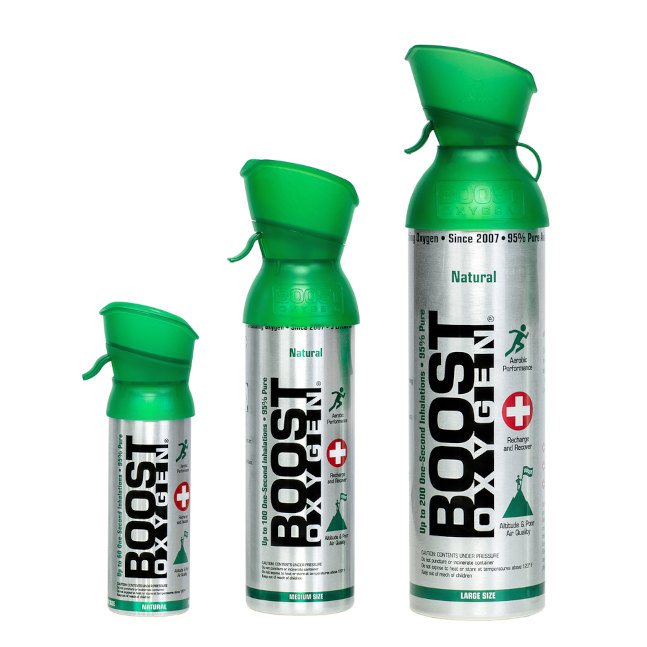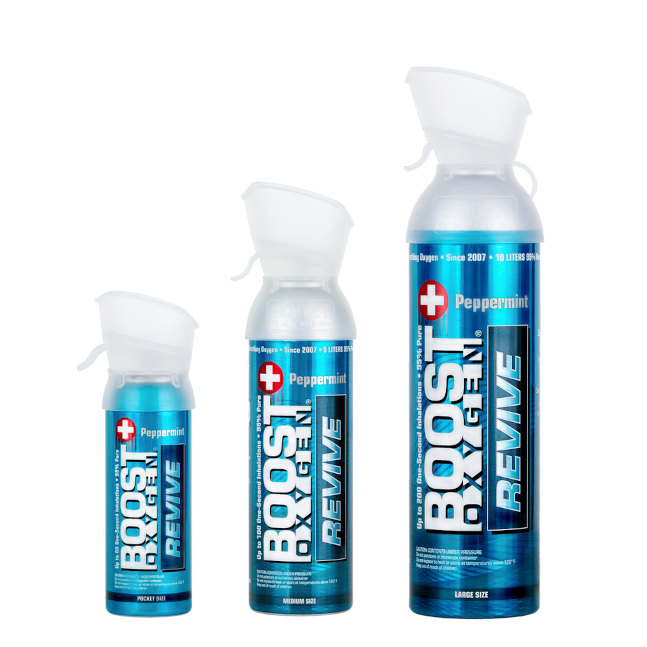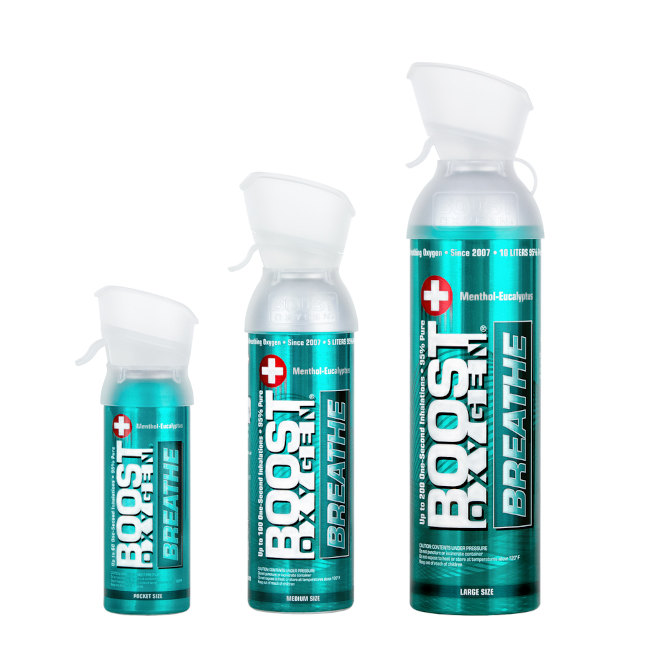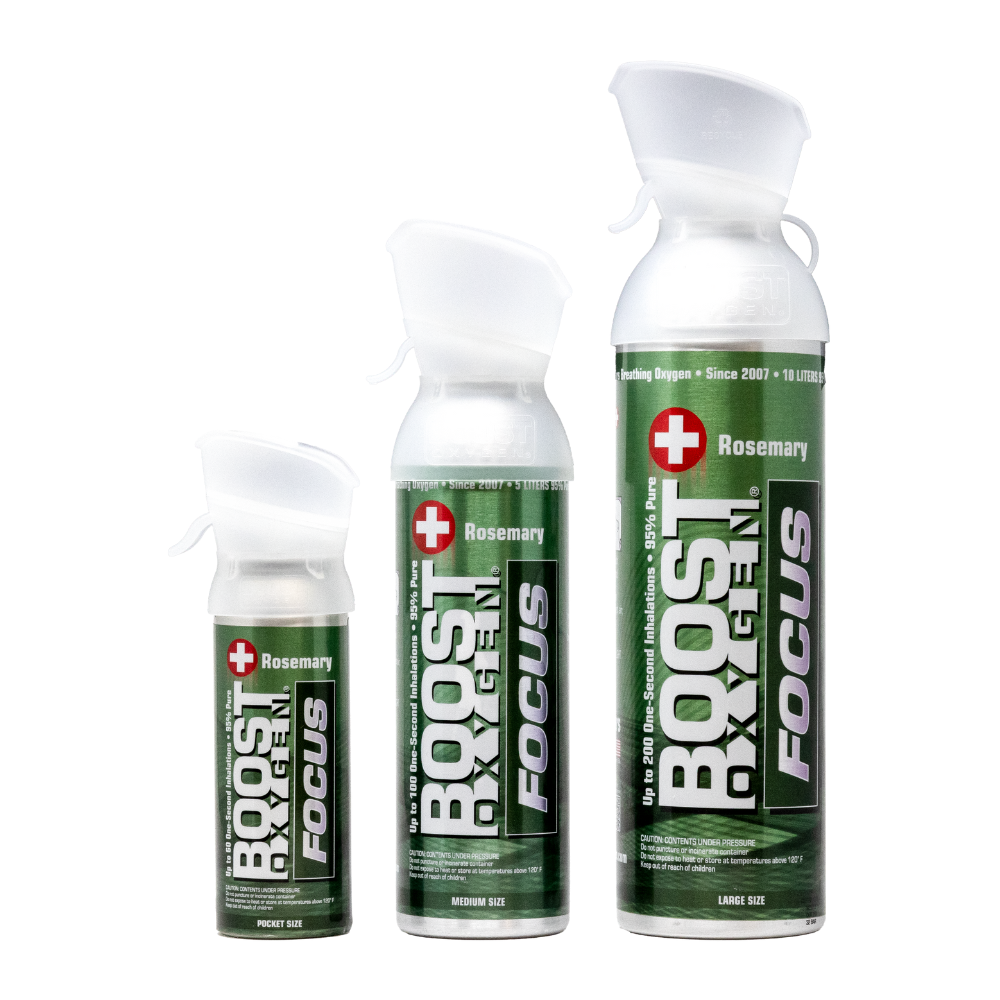Boost Oxygen vs. Energy Drinks
One common question we often receive: Is Boost Oxygen like an energy drink? Boost Oxygen is portable 95% pure supplemental oxygen for all-natural respiratory support, energy and performance. Our product is natural and healthy – unlike energy drinks, caffeine products and stimulants which can have negative effects on your body and overall health.

The Rise In Popularity Of Energy Drinks
Whether working longer hours, staying alert while driving, keeping focus during a game or pulling an all-nighter to study for an exam (and dozens of other reasons) people have always turned to caffeine, sugar and other stimulants for artificial energy. In decades past, the popular choice was caffeine in the form of coffee (marketed to adults) or soda (marketed to teens). The narrative was perpetuated by television, movies and a common (incorrect) assumption that drunk, hung over or tired people could be instantly revived with a cup of coffee!
In the 1990s and early 2000s, energy drinks like Red Bull and Monster (and dozens of other brands that followed) gained popularity as an “alternative” to soda and soft drinks. They were also marketed to increase alertness and energy levels, but they contained more caffeine and sugar than sodas and some contained harmful artificial sweeteners.
Because these energy drinks were considered a “new category” at the time, there was also a lack of regulation when it came to marketing these products to adolescents and teens. Although statements on the energy drinks warned that these beverages may not be suitable for children, youth were among their largest consumers. Thanks in part to this lack of regulation and massive marketing campaigns, energy drinks quickly exploded in popularity. It’s now estimated that the energy drink industry will generate approximately $100 billion by 2026.
The Negative Side Effects Of Energy Drinks and Caffeine
After water, sugar is the main ingredient in most energy drinks. A nutritional comparison shows that a 12-ounce cola drink contains about 39 grams of sugar, 41 grams of sugar in an energy drink. Research has found that consuming high-sugar drinks of any kind can lead to weight gain and an increased risk of type 2 diabetes, cardiovascular disease, gout, increased stress, aggressive behavior, increased blood pressure, poor sleep quality and stomach irritation. Another result that is rarely discussed is the effect these products can have on your skin and teeth. Caffeine and sugar products can lead to acne and skin aging, as well as decay, damage and staining to your teeth.
Energy drinks are now common at gas stations and grocery stores alongside other caffeine products like coffees and sodas. They promise a quick fix for your drowsiness. In addition to the negative health effects, they can also cause you to crash after their effects expire – forcing you to drink even more to avoid that crash. The same can be said of the effect of coffee on your body.
According to the Harvard School Of Public Health, the following are specific concerns with energy drinks:
- Amplified negative health effects in adolescents.Children and teens may experience heightened effects from the high amounts of caffeine, added sugars including high fructose corn syrup, low-calorie sweeteners, and herbal stimulants, partly due to their smaller body size.
- Marketing tactics towards youth. Estimates show more than a 240% increase in U.S. and worldwide sales of energy drinks. It is a $21 billion industry, with marketing campaigns targeting youth and being sold in places that are easily accessed by this age group. [Youth are exposed to energy drink advertising on children’s websites, computer games, television, supermarkets, and sporting events. Research has shown that adolescents lack maturity in key areas of the brain and are more likely to engage in risk-taking behavior, making them vulnerable to risky behaviors sometimes portrayed in energy drink marketing. Youth are attracted to energy drinks due to effective marketing, influence from peers, and lack of knowledge about their potential harmful effects.
- Negative health outcomes. Emerging evidence has linked energy drink consumption with negative health consequences in youth like risk-seeking behaviors, poor mental health, adverse cardiovascular effects, and metabolic, renal, or dental problems.
- Excessive caffeine. Too much caffeine from any beverage, particularly when several are taken in one day in sensitive individuals, can lead to anxiety, insomnia, heart problems like irregular heartbeat and elevated blood pressure, and in rare cases seizures or cardiac arrest. Some energy drinks may contain as much as 500 mg per can (the amount in 14 cans of cola).
- High sugar content. Because of the excessive sugar content in some energy drinks, they carry the same health risks associated with other sugar-sweetened beverages.
- Dangers with alcohol. A greater danger is introduced if energy drinks are combined with alcohol, a trend largely seen in underage drinkers and associated with binge drinking. Studies suggest that drinking this type of cocktail leads to a greater alcohol intake than if just drinking alcohol alone. This may be because energy drinks increase alertness that masks the signs of inebriation, leading one to believe they can consume even more alcohol.
- Lack of regulation. The Food and Drug Administration (FDA) does not regulate energy drinks but enforces a caffeine limit of 71 mg per 12 ounces of soda; energy drinks typically contain about 120 mg per 12 ounces. However, energy drink manufacturers may choose to classify their product as a supplement to sidestep the caffeine limit. For companies that classify their energy drinks as beverages, the American Beverage Association published voluntary guidelines that advise accurate listings of caffeine content, restriction of marketing to children, and reporting of adverse events to the FDA. However, compliance to these guidelines has been found to be low.
Boost Oxygen as a healthy alternative to energy drinks and caffeine
Our Boost Oxygen portable 95% pure supplemental oxygen canisters have no caffeine, sugar, carbs or calories. There is no sugar crash with oxygen. Supplemental oxygen is completely natural, healthy and more relaxing and restorative than energy drinks or coffee.
Boost Oxygen is also an all-natural respiratory support. Increased oxygen intake has been reported by health professionals as a natural health and well-being aid that promotes energy and better mental acuity. Breathing Boost Oxygen improves cognitive performance, memory and reaction time and also makes you feel more alert and energetic.
If you’re looking for energy, focus or a healthy pick-me-up when working long hours, driving, studying or competing in a game, we encourage you to try supplemental oxygen instead of energy drinks or caffeine products!
We also encourage you to read these additional resources about the negative effects of energy drinks and caffeine
Are Energy Drinks Addictive to Kids?
Harvard: The Nutrition Source On Energy Drinks
*Disclaimer: 95% Pure Boost Oxygen is for recreational purposes only, ideal for athletes and sports enthusiasts, older adults, and people at high altitude or in poor air quality. No prescription is needed to purchase Boost Oxygen. As it is not medical-grade oxygen, not a drug, and not intended for the treatment of any medical condition or disease, it is neither regulated nor approved by the FDA and thus the Agency has not assessed any of the statements herein. Consult your physician if you have any medical conditions.










